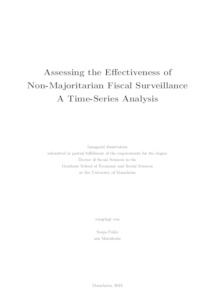|
Assessing the effectiveness of non-majoritarian fiscal surveillance : A time-series analysis
Pohle, Sonja
![[img]](https://madoc.bib.uni-mannheim.de/52209/1.hassmallThumbnailVersion/Dissertation_Pohle.pdf)  Vorschau |
|
PDF
Dissertation_Pohle.pdf
- Veröffentlichte Version
Download (1MB)
|
|
URL:
|
https://madoc.bib.uni-mannheim.de/52209
|
|
URN:
|
urn:nbn:de:bsz:180-madoc-522092
|
|
Dokumenttyp:
|
Dissertation
|
|
Erscheinungsjahr:
|
2019
|
|
Ort der Veröffentlichung:
|
Mannheim
|
|
Hochschule:
|
Universität Mannheim
|
|
Gutachter:
|
König, Thomas
|
|
Datum der mündl. Prüfung:
|
15 Februar 2019
|
|
Sprache der Veröffentlichung:
|
Englisch
|
|
Einrichtung:
|
Außerfakultäre Einrichtungen > GESS - CDSS (SOWI)
Fakultät für Sozialwissenschaften > Politikwissenschaft, Europäische Politik (König 2007-)
|
|
Fachgebiet:
|
320 Politik
|
|
Freie Schlagwörter (Englisch):
|
Excessive Deficit Procedure, Stability and Growth Pact, Multi-Level Models, Bayesian Statistic
|
|
Abstract:
|
Little research has examined why the European Commission is so hesitant in opening an Excessive Deficit Procedure (EDP) against EU member states with deficit and debt levels that violate the Stability and Growth Pact (SGP). In order to explain this, I argue that the European Commission can be classified as a non-majoritarian institution (NMI) that
lacks direct legitimization via elections and complete information about the nature of noncompliance. When sanctioning elected governments, it therefore has to rely on voters’ support for compliance with the SGP and a sufficient amount of transparency about the country’s
economic situation. In order to test this argument empirically, I present a Bayesian multi-level probit model as a new method for analyzing small N panel-heteroskedastic and contemporaneously correlated binary time-series cross-sectional (BTSCS) data and test its
compared with existing methods. I find evidence for the suitability of the Bayesian multilevel probit model for modeling BTSCS characteristics, but not for the effect of strong public support and transparency on the Commission’s EDP initiations. My contributions are therefore theoretical, empirical and methodological. Theoretically, I combine arguments from European Union research and judicial politics on NMI decision-making to explain the sanctioning of SGP violations by the European Commission. Empirically, I conduct the first quantitative analysis to test these arguments and assess the determinants of the European Commission’s sanctioning behavior. Methodologically, I provide researchers with
an alternative technique for BTSCS data analysis.
|
 | Dieser Eintrag ist Teil der Universitätsbibliographie. |
 | Das Dokument wird vom Publikationsserver der Universitätsbibliothek Mannheim bereitgestellt. |
 Suche Autoren in Suche Autoren in
Sie haben einen Fehler gefunden? Teilen Sie uns Ihren Korrekturwunsch bitte hier mit: E-Mail
Actions (login required)
 |
Eintrag anzeigen |
|
|
